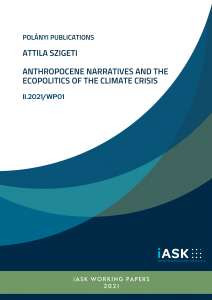Kutatás és Tanulmányok
 About the Author
About the Author
Attila Szigeti (Romania) holds a Joint PhD in Philosophy from the Paris XII – Val de Marne University and Babes-Bolyai University, Cluj. He is Assistant Professor at the Hungarian Department of Philosophy, Babeş-Bolyai University, where he teaches Modern and Contemporary Philosophy and is also coordinator of the Critical Theory and Multicultural Studies MA Program. His main research areas are: Contemporary Continental Philosophy, French Phenomenology, Critical Theory, Critical Environmental Philosophy, Philosophy of Mind and Cognitive Science. He has published one book and several articles in these fields, and has been visiting researcher in Paris, Copenhagen, Budapest etc.
Abstract
The Anthropocene is one of the most important multi-disciplinary research topics to have emerged in the last two decades, cutting across dichotomies between the human and the natural world, as well as the scientific disciplines built around them, and posing, therefore, unprecedented methodological, theoretical-conceptual and ethical-political challenges for both the natural and the social sciences. It is used to cover a whole range of contemporary environmental threats: anthropogenic climate change, loss of biodiversity, the sixth mass extinction, ocean acidification, disruption of the biogeochemical cycles of the earth, etc. This paper proposes another reproach against the dominant Anthropocene narrative called the “Capitalocene” which rather argues that the climate/environmental crisis is not caused by “human nature” but by historically specific relations of re/production and property, namely: by the exploitative and expropriative socio-economic relations of capitalist accumulation.
Key words: Anthropocene, “Capitalocene”, capitalist accumulation, Degrowth, Green New Deal
II.2021/WP01Letöltés